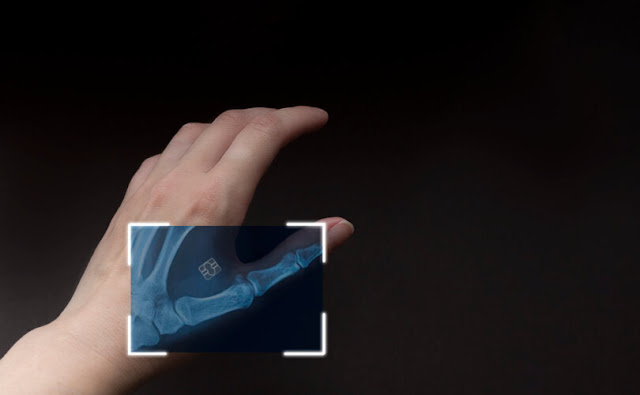Written by Mary Villareal
 |
| See here |
A Swedish biohacker and advocate for human augmentation is now promoting the use of microchips implanted under the skin to record Wuhan coronavirus (COVID-19) certificate status.
Hannes Sjöblad, co-founder of BioNyfiken, a Swedish association of biohackers, then showed Swedish newspaper Aftonbladet how to pull up a digital COVID certificate by simply placing his cell phone against his forearm.
“Get your COVID certificate in a chip in your hand or elsewhere under the skin. It is increasingly popular to insert a chip into the body with different types of information and now you can also insert your COVID certificate in the chip,” Sjöblad told the daily newspaper.
Sjöblad said microchips can save personal information, from contact information to bodily identifiers such as blood type and health indicators.
The news outlet also reported that Olle Helkimo, a service manager at Epicenter Stockholm, getting a chip implanted into his hand at a restaurant table. He said that the implantation felt like “nothing at all.”
Sjöblad has been promoting chip implants for years as a form of ID access to personal devices like phones and computers. He said back in 2016 that chip implants can also be used to sign payments, such as through Bitcoin. However, he admitted that microchip is an easy-to-hack technology.
According to digital cultures researcher Moa Petersen, there have been around 6,000 people in Sweden who have inserted chips in their hands.
Petersen said those with implants have already stopped carrying vaccine passports, keys, ID cards and even train tickets – thanks to the radio frequency identification technology, which is a wireless system comprising of tags and readers.
Proposal met with concern
Investigative reporter Edwin Black said the technology could have “frightening” consequences. (Related: Microchipping goes mainstream: Wisconsin company announces plan to chip employees.)
“This means that human behavior can be trackable and controllable by the injector, and if that injector is a government or a corporation under the control of government,” he said.
 |
| See here, here, and here |
 |
| See here and here |
“We are turning a corner where government will be able to wipe out a whole class of people based on their origin or opposition to policy.”
Christian commentators also noted that such technology could usher in totalitarianism of biblical proportions.
Meanwhile, the vaccine passports will be required in Sweden for access to theaters, concerts and other larger indoor events beginning December 1.
Requiring digital green certificates or vaccine passports and possible future chip implants for traveling and taking part in everyday life will create two classes of citizens based on their vaccination status.
Radio Frequency Identification (RFID) chips can be ubiquitous in computing ambient intelligence. These chips contain electronically stored information that use wireless electromagnetic fields to transfer data.
With the help of these RFID tags, data up to several hundred characters can be communicated wirelessly, with the basic goal of automatically identifying and tracking tags attached to objects.
However, the process of human implants became controversial due to ethical issues.
Social scientists are just beginning to comprehend the attitude of people to the implanted RFIDs. In a study at the Bridgewater State University, 141 students were interviewed on their opinions about RFID implantation.
Respondents were questioned whether they would willfully have an implant as a rescue device to avert identity theft, for national security reasons or to ensure the safety of themselves and their families.
About a third of respondents were ready to be installed, while less than half of them were not. The study subjects were least comfortable with chipping as a remedy for identity theft. The reasons that had the most support for chipping was to save their lives and for the safety of their family.
Another small survey showed that 18 out of 23 people questioned opposed to the concept of implantable chips as their identifiers.
Read more news related to surveillance technology at Surveillance.news.
(In VACCINES.NEWS)
 |
| See here and here |
 |
| See here and here |
 |
| See here, here, and here |
 |
| See here |
 |
| See here |
 |
| See here, here, and here |

























Nenhum comentário:
Postar um comentário